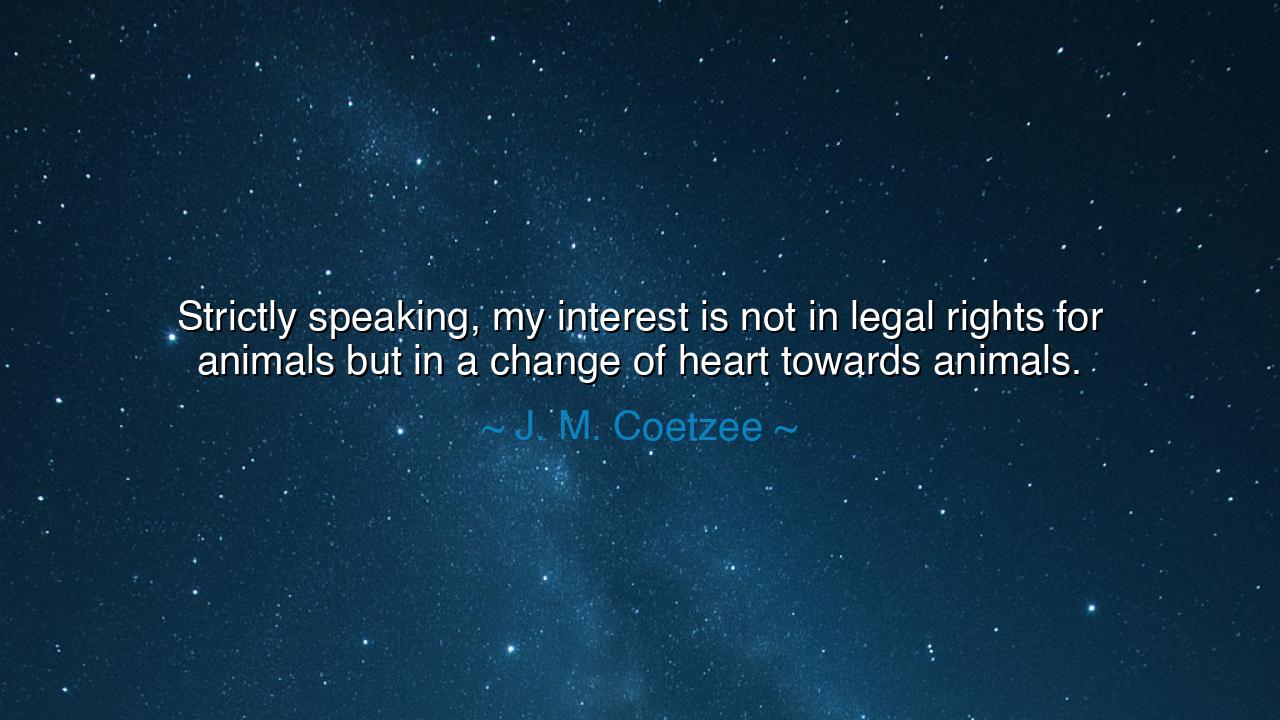
Strictly speaking, my interest is not in legal rights for animals
Strictly speaking, my interest is not in legal rights for animals but in a change of heart towards animals.






When J. M. Coetzee said, “Strictly speaking, my interest is not in legal rights for animals but in a change of heart towards animals,” he spoke not as a lawyer or philosopher alone, but as a seer of the human conscience. His words reach beyond the courts and legislatures of man into the quiet chambers of the soul. They remind us that true transformation begins not with law, but with love — that justice, no matter how finely written, is empty if compassion does not dwell within the heart of those who uphold it. In this single sentence, Coetzee speaks for all those who understand that civilization is not measured by its statutes, but by the tenderness it shows toward the powerless.
The origin of this quote lies in Coetzee’s lifelong meditation on morality, cruelty, and empathy — themes that breathe through his novels such as The Lives of Animals and Elizabeth Costello. A Nobel laureate of literature, he used fiction not to escape truth, but to unveil it. He recognized that humanity’s treatment of animals is not merely an ethical issue, but a mirror held up to the human condition itself. When he said he was not focused on legal rights, he was not rejecting them — rather, he was pointing toward something deeper, something prior: the moral awakening that must precede any meaningful reform. For without compassion, the law becomes an empty shell, a cage of reason without a soul.
Throughout history, the law has followed — never led — the moral progress of mankind. The abolition of slavery, the rights of women, the dignity of labor — none of these began in courtrooms. They began in hearts that could no longer bear the sight of suffering. Coetzee reminds us that the heart must change before the law can be just. The ancients knew this truth well: in the teachings of Buddha, who spoke of compassion for all living beings; in the writings of Pythagoras, who taught that the soul of man and beast are one; and in the gentle example of St. Francis of Assisi, who called the birds and wolves his brothers. These sages understood that moral evolution begins when the heart expands its circle of empathy beyond the self.
When Coetzee speaks of a “change of heart,” he calls us to confront the distance between knowing and feeling. Many may know, in reason, that cruelty to animals is wrong; yet they continue to consume the fruits of that cruelty, detached from the suffering it entails. The “change of heart” he envisions is not intellectual agreement — it is spiritual transformation, the awakening of the inner eye that sees all life as sacred. This transformation cannot be legislated. No law can command love, nor compel compassion. It must arise, as dawn arises, within the individual soul. Only then does the law become not a chain that binds, but a reflection of the harmony already born in the human spirit.
History offers us a parable that illustrates this truth. When Emperor Ashoka of India, once a conqueror drenched in blood, witnessed the suffering he had caused, he was seized by remorse so profound that it remade his kingdom. He renounced violence, embraced compassion, and declared that all living creatures, even animals, were worthy of mercy. It was not a decree that transformed him — it was a change of heart. And through that change, laws of kindness were born, not as tools of control, but as expressions of conscience. Coetzee’s words recall this same ancient wisdom: that true justice flows from the wellspring of empathy, not the parchment of legality.
In a modern world obsessed with legislation, Coetzee’s message cuts like light through fog. He warns us that laws without love are brittle, and that ethical systems built only on logic cannot heal the fractures in the human soul. What good is it, he asks, if animals are granted legal rights, yet the hearts of men remain indifferent? It is not the signing of documents, but the softening of hearts, that will end cruelty. For every generation that forgets this truth, progress becomes performance — noble words spoken over unhealed wounds.
And so the lesson is clear: let the heart lead the law, not the law the heart. We must begin not by demanding new legislation, but by cultivating new compassion — by seeing in the eyes of every creature the same longing for peace that lives within ourselves. Let every meal, every act of consumption, every encounter with the living world become an opportunity to practice mercy. For when the heart changes, the world follows. As J. M. Coetzee teaches, the salvation of life — human and animal alike — begins not in the courtroom, but in the quiet decision to love what we once ignored. And when enough hearts awaken, the law will have no choice but to follow.






AAdministratorAdministrator
Welcome, honored guests. Please leave a comment, we will respond soon